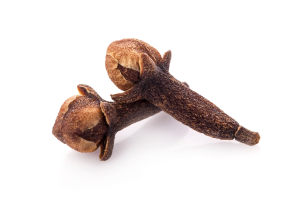 Clove is the dried flower bud of the clove tree, a tree in the Myrtaceae family.
Clove is the dried flower bud of the clove tree, a tree in the Myrtaceae family.
This tree is native to the Bat Jan Islands, a micro archipelago in the center of the Moluccas (Indonesia). Clove has a warm, sweet and tangy, woody and spicy flavor. it has been appreciated for centuries in traditional cuisine to spice up dishes, but also for its therapeutic benefits. Indeed, they have been used for a long time in traditional medicine for their anti-inflammatory, analgesic, antioxidant, anti-emetic and antiseptic properties. Its smell inevitably evokes the dentist’s office!
For the mouth and teeth:
Cloves contain an active ingredient called eugenol which has anti-inflammatory, analgesic, anesthetic and antiseptic properties to relieve oral and dental disorders (gingivitis, cavities, canker sores, bad breath, dental plaque).
For cold symptoms
Cloves have expectorant (clears viscosity from the respiratory tract), anti-inflammatory, anti-infectious and analgesic (reduces pain) properties.
For menstrual pain:
Cloves could reduce or even relieve symptoms of dysmenorrhea thanks to their analgesic, anti-inflammatory and anti-nausea properties. In addition, some studies believe that cloves can slow down the production of prostaglandin and histamine.
Urinary infections:
Cloves are said to be useful for preventing and relieving urinary infections thanks to their antibacterial, anti-inflammatory and analgesic properties. Indeed, cloves have an active ingredient called eugenol which has a bactericidal action against the E. Coli bacteria responsible for urinary infections. Studies have shown that eugenol inhibits the growth and reproduction of these bacteria, which may help prevent the spread of infection. In addition, cloves have anti-inflammatory and analgesic properties that help reduce inflammation of the bladder, as well as the pain associated with urinary infections. Eugenol has also been shown to help reduce swelling and irritation of the urinary tract, and limit feelings of pain.
Hot flashes and night sweats:
Some users report that Cloves can help reduce hot flashes and night sweats.
Joint pain :
Cloves have anti-inflammatory and antioxidant properties that could relieve joint pain.
To improve digestion:
Traditionally, cloves were used to reduce gas and improve digestion thanks to its carminative, antispasmodic and anti-inflammatory properties.
To prevent Helicobacter pylori:
Thanks to eugenol, cloves could be effective in preventing the appearance of Helicobacter pylori. H. pylori, this bacteria which mainly develops in the stomach. It causes inflammation of the stomach (gastritis), and can develop into an ulcer when left untreated.
Usage tips In infusion:
- The best way to benefit from the benefits of cloves is to make infusions. To do this, pour 2 to 3 cloves into a cup of hot water and let it infuse for 10 to 15 minutes. Then, filter the mixture and drink 2 to 3 cups per day
- In sitz baths: Sitz baths are very useful for optimizing the entry of the active ingredients of Cloves directly into the area concerned. In this case, do not let it cool and allow the vapors to rise to the affected area for 5 to 10 minutes.
Precautions for use:
- Pregnant and breastfeeding women, as well as babies and children under 6 years old People suffering from stomach ulcers, epilepsy, as well as those having anticoagulant and antiplatelet treatment, should not use or consume cloves.
- Do not use or consume Cloves in excess, as they may cause side effects such as nausea, heartburn, vomiting and abdominal pain. In the long term, cloves can cause an allergy or be toxic to the liver.
- It is therefore preferable not to exceed 10 days of treatment, and to take breaks of one week to two weeks between each of them.



Leave a Reply